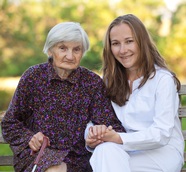Charities call for more training for care staff after CQC reveals care homes are 'failing people with dementia'

The Care Quality Commission’s Care Update has highlighted two areas where the quality of care provided in the UK is currently not achieving CQC standards.
The areas of failings highlighted were primarily services for people with dementia and in independent learning disabilities and mental health services.
CQC chief executive David Behan said: “The majority of services are delivering good quality care; however care providers must do more to make sure that care is based on people’s individual needs. This care update draws attention to two areas where this is not happening.”
The report underlined the problem with the level of unnecessary admissions of people with dementia into hospital from care staff. The Care Update highlighted that people in care homes who have dementia are more likely to go into hospital with avoidable conditions such as urinary tract infections, pressure sores and dehydration - than people without dementia.
Karen Harrison Dening, interim head of admiral nursing at Dementia UK said: “This report is a timely reminder that more needs to be done to improve the quality of care for people with dementia. Too often we hear of cases where people with dementia have been admitted to hospital where care and treatment could have been administered in the community.”
Reasons for unnecessary admissions into hospital have been linked with a lack of appropriate training of care home staff or community teams, as well as the difficulty of diagnosing and communicating with someone who has both dementia and another pain or condition.
Janet Morrison, chief executive of Independent Age said: “We consider it shocking that people living with dementia are being admitted to hospital for conditions that should be picked up, treated and even prevented in the first place by better care in the care home. Older people with dementia continue to be denied even the very basics of care.

“As a result, we call for more training for staff and better leadership to ensure that people with dementia receive the care and support they deserve. Professionals continue to fail to spot the early signs of dementia.
“Improved access to advice and information is also paramount so families and carers of older people with dementia are aware of their rights and entitlements and how to challenge when poor care occurs.”
NHS Confederation chief executive Mike Farrar added: "The changes required need not be expensive to implement or to deliver, but they do require a step change in behaviours, values, training, and importantly, improvements to the way the service is set up to make sure that no one falls between the cracks."
The findings are based on over 20,000 inspections carried out by the CQC between 1 April and 31 December 2012.
The Alzheimer’s Society is urging hospitals to drive up standards by appointing dementia champions on each ward so that staff can be trained to appropriately diagnose and treat dementia patients who have been admitted to hospital for other illnesses.
Jeremy Hughes, chief executive at Alzheimer’s Society said: “This report lays bare the scandalous extent to which the NHS is failing people with dementia. Hospitals are supposed to be places of recovery but people with dementia are going in too often, staying too long and dying in a hospital bed much more than those with any other condition.”
President of the Association of Directors of Adult Social Services (ADASS), Sarah Pickup said: “The issues highlighted in today’s CQC report are less about the care and treatment people receive that relates directly to their dementia, and more about how other conditions they might suffer from are diagnosed and treated.”
“The findings highlight the need for more and better dementia training among a wide range of staff across health and care services. The person that treats an infection, or deals with a toothache, or treats a hip fracture, needs to understand how to do this when the patient has dementia.

Ms Pickup added: “The condition being treated may be the same as someone without dementia but a different approach may well be needed”
As well as dementia services, the Update also emphasised continuing concerns about the quality of services for people with mental health issues and learning disabilities.
Mr Behan said: “It’s six months since recommendations were made following the abuse of people with learning disabilities at Winterbourne View. While there has been some improvement by those delivering services for people with mental health problems and learning disabilities, there is still some way to go and CQC expected improvements to be made more quickly.
“We are still seeing too many independent mental health and learning disability services not delivering care that puts people first.”
Jan Tregelles, acting chief executive of learning disability charity Mencap, and Vivien Cooper, founder of The Challenging Behaviour Foundation said: "Given the terrible abuse and neglect uncovered almost two years ago at Winterbourne View, it is unacceptable that people with a learning disability are still receiving poor care. Progress to address these failings has been too slow.
“We know that there are many people with a learning disability in assessment and treatment units, like Winterbourne View, who have experienced abuse and neglect. Their families are still fighting to bring their loved ones closer to home. Local commissioners have a responsibility to take urgent action to develop support and services to make this happen."
Pressure to show that active steps have been taken to ensure that there are no more repeats of the neglect seen at Winterbourne View and Mid Staffordshire has been a focus of the CQC Care Update.
The CQC has claimed the quality of services is not improving quickly enough in light of the Mid Staffordshire Inquiry, and Mr Farrer added: “The health and care system is probably under the most pressure it has ever experienced, facing a combination of unprecedented financial pressures, radical structural reforms and reorganisation about to come into effect, and the intense focus on quality which the Mid Staffordshire Inquiry has produced.”
Latest News
 29-Jul-24
Dementia Bus gives carehome.co.uk staff insight into life with dementia
29-Jul-24
Dementia Bus gives carehome.co.uk staff insight into life with dementia
 27-Jul-23
UK's top home care agencies in 2023 revealed
27-Jul-23
UK's top home care agencies in 2023 revealed
 30-Nov-22
A quarter of older people keep their falls secret from family
30-Nov-22
A quarter of older people keep their falls secret from family
 29-Nov-22
'Covid-19 has not gone away' say terminally ill
29-Nov-22
'Covid-19 has not gone away' say terminally ill
 28-Nov-22
IT consultant who received poor care opens 'compassionate' home care business
28-Nov-22
IT consultant who received poor care opens 'compassionate' home care business